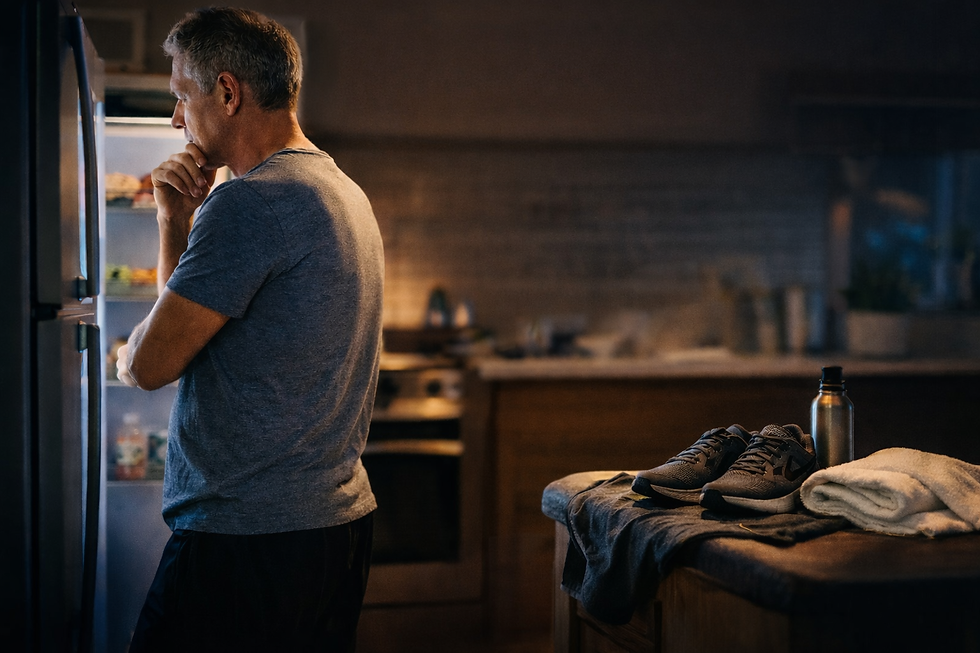Life Performance Blog: Why You Shouldn't Avoid Discomfort
- Chris Deavin
- Aug 21, 2020
- 3 min read

The right kind of discomfort and stress, in the right amount, can help us.
Let's say you're walking past a house on fire.
Do you run inside, on the off chance that someone might be in there? Probably not. You know you'll get burned. Probably, you call the fire department instead.
But let's say you arrive at the house and realise your baby is inside.
You dash inside the house, forgetting about your own discomfort, desperately searching for your child.
When you find your baby, grab her and bring her outside, you're probably suffering burns and smoke inhalation. Do you care much? Not in that moment.
You might not even feel the pain at all, your adrenaline is so high. All you care about is your child.
In that second example, you're willing to tolerate discomfort in the service of a higher purpose—saving your baby.
In fact, evolution has equipped us beautifully with systems (such as endorphins) that help us ignore pain when we're focused on survival or doing something more important.
The morals of the story:
1. Discomfort is subjective.
What we feel will depend on where we place attention. 2. We will need to deal with discomfort.
Life will be uncomfortable. It's non-negotiable. Practising accepting that will be worthwhile.
3. We can deal with discomfort.
Our bodies have the mechanisms necessary for managing and bouncing- back from discomfort. One of those mechanisms is purpose and future- thinking. If we're acting in the service of a strong purpose, we can more easily tolerate the discomfort in the moment.
4. Discomfort, in the right amount, makes us stronger.
You just saved your baby from a fire. Now the rest of your life probably seems a lot easier.
5. To change your experience of discomfort, and your bigger purpose and focus on it.
What brings you joy? What excites you about your coaching journey? What are your goals? Those are the things that pull through discomfort. Stay focused on those things. How food and eating soothe discomfort
Changing your expectations, attitude, and actions around eating is incredibly uncomfortable. Food is deeply entwined in thoughts, emotions, and actions. There's a lot going on.
For example:
It's hard to "waste food".
Maybe you can hear your parents' voices in your head: "There are starving children! You shouldn't leave food on the plate!"
Food keeps us occupied.
If we stay "busy" with food, then we don't have to deal with other things. Like plain boredom.
Food numbs us.
It's a good painkiller for emotional and physical distress.
Emotions can feel like hunger.
Often, we mix up emotions such as anxiety or anger with hunger. It feels like hunger... but it isn't.
Food behaviours are habitualized and comfortable.
We do a lot of things automatically, and it's common to have a day anchored around food and eating behaviours. Changing them can feel unmooring and chaotic.
Certain food behaviours form social bonds.
We might be worried about the social consequences of changing food behaviours, like not wanting to say no, make a fuss, or stand out as a "weirdo" at social events with friends and family.
Food is everywhere.
Food is nearly constantly available no matter what the environment.
It's easy to use food to avoid discomforts and make choices that don't match goals. Reaching any meaningful goal will require pushing through the discomfort of changing.
The rewards of tolerating discomfort are big.
Living and thriving through uncomfortable situations will leave you with an unprecedented understanding of what you can do. You'll have lived through an experiment with testing your capacity. That's the only way to build confidence that you truly know what your capacity is.
A little bit of discomfort can bring a whole lot of feeling good.
The 10-minute discomfort deal
Try making a "discomfort deal" with yourself:
1. When I feel discomfort, I promise to sit with that discomfort—in whatever form it takes—for 10 minutes.
2. During that time, I will notice and name the discomfort as best I can. 3. After that, I will make the choice I feel is appropriate.
Set a timer if you need to.
Put this deal into effect every day for the next two weeks and you'll be stronger still.
Stay uncomfortable for 10 minutes. That's it. Deal?
Chris, myHealthCoach



Comments